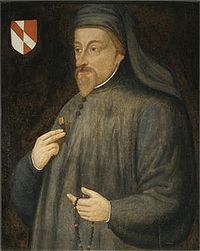
Portrait of Chaucer from the 17th century.
(This work of art is in the public domain)
Chaucer was an English author, poet, philosopher, bureaucrat, courtier and diplomat. Although he wrote many works, he is best remembered for his unfinished frame narrative The Canterbury Tales. Sometimes called the father of English literature, Chaucer is credited by some scholars as the first author to demonstrate the artistic legitimacy of the vernacular English language, rather than French or Latin. |
The Canterbury Tales
General Prologue (excerpts)
Whan that Aprill with his shoures sote°
The droghte° of Marche hath perced to the rote,°
And bathed every veyne° in swich licour,°
Of which vertu° engendred is the flour;
Whan Zephirus° eek with his swete breeth
Inspired° hath in every holt° and heeth°
The tendre croppes,° and the yonge sonne
Hath in the Ram his halfe cours y-ronne;(1) And smale fowles° maken melodye,
That slepen al the night with open yë°—
So priketh hem Nature in hir corages(2)—
Than longen° folk to goon° on pilgrimages,
And palmeres for to seken straunge strondes,(3)
To ferne halwes,° couthe° in sondry londes;
And specially, from every shires ende
Of Engelond to Caunterbury they wende,
The holy blisful martir(4) for to seke,°
That hem hath holpen,° whan that they were seke.°
Bifel° that, in that seson on a day,
In Southwerk at the Tabard° as I lay°
Redy to wenden° on my pilgrimage
To Caunterbury with ful devout corage,°
At night was come into that hostelrye°
Wel nyne and twenty in a companye,
Of sondry folk, by aventure° y-falle°
In felaweshipe, and pilgrims were they alle,
That toward Caunterbury wolden° ryde.
The chambres° and the stables weren wyde,°
And wel we weren esed° atte beste.°
And shortly, whan the sonne was to° reste,
So hadde I spoken with hem everichon°
That I was of hir felawshipe anon,
And made forward° erly for to ryse,
To take oure wey, ther as I yow devyse.°
But natheles,° whyl I have tyme and space,
Er that I ferther in this tale pace,°
Me thinketh it acordaunt to resoun(5)
To telle yow al the condicioun(6)
Of ech of hem, so as it semed me,°
And whiche° they weren, and of what degree,°
And eek in what array° that they were inne;
And at a knight than wol° I first biginne. |
sweet showers
dryness / root
vein / such moisture
By power of which
the west wind
Breathed into / wood / heath
sprouts
Ram y-ronne1
birds
eye(s)
Nature corages2
Then long / go
And strondes3
far-off shires /known
seek
helped / sick
It befell
(an inn) / lodged
depart
heart
inn
chance / fallen
wished to
bedrooms / spacious
made comfortable / in the best (ways)
at
each and every one
agreement
(will) tell
nevertheless
pass on
seemed to me
what / status
clothing
will
|
(1) Has run his half-course in the Ram; i.e., has passed through half the zodiacal sign of Aries (the Ram), a course completed on April
(2) A rhetorically decorative way of indicating the time of year.Nature so spurs them in their hearts.
(3)
And pilgrims to seek foreign shores.
(4)
Thomas Becket, archbishop of Canterbury, murdered in 1170 and canonized shortly thereafter. The place of his martyrdom was the greatest shrine in England and much visited by pilgrims.
(5)
It seems to me reasonable (proper).
(6)
Character, estate, condition.
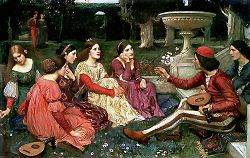 April, from the Trés Riches Heures de Duc de Berry, c1406-9.
April, from the Trés Riches Heures de Duc de Berry, c1406-9.(This work of art is in the public domain)
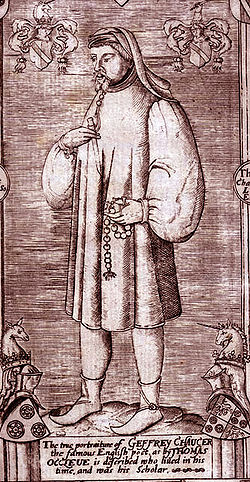 Engraving of Chaucer from Speght's edition.
Engraving of Chaucer from Speght's edition.
(This work of art is in the public domain)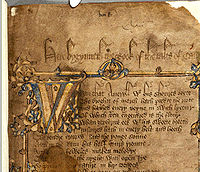 Short poem "To Rosemounde"
Short poem "To Rosemounde"
(This work of art is in the public domain)
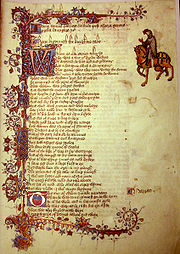 A 19th century depiction of Chaucer
(This work of art is in the public domain.)
A 19th century depiction of Chaucer
(This work of art is in the public domain.). 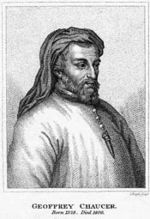 Portrait of Chaucer from a manuscript by Thomas Hoccleve
Portrait of Chaucer from a manuscript by Thomas Hoccleve
(c. 1368 – 1426), English poet, who personally knew
Chaucer, so it is probably an accurate depiction.
(This work of art is in the public domain)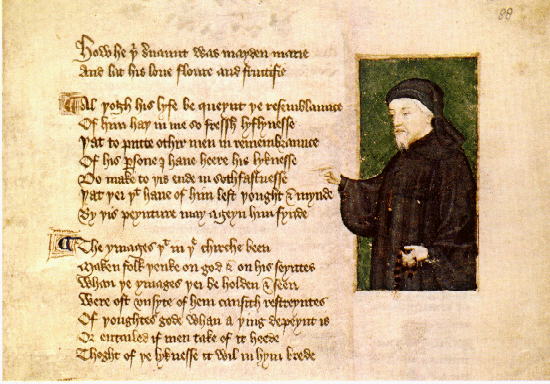
|
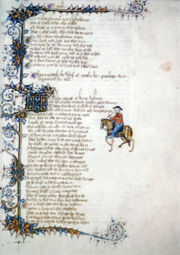





![]()
![]()
![]()
